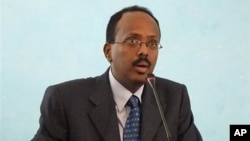Mohamed Abdullahi Mohamed has been sworn in as the new prime minister of Somalia after nearly two weeks of political wrangling over his nomination.
Somalia's new prime minister took his oath of office in front of a crowd that included members of the country's parliament and President Sheikh Sharif Sheikh Ahmed in Mogadishu.
Speaking to VOA after being approved by parliament, Mohamed Abdullahi Mohamed said he would pursue a policy of reconciliation. The new prime minister said he would speak with any armed groups interested in dialogue, but said they must first disarm, renounce violence and recognize the transitional government as the only existing government in Somalia.
The Somali parliament endorsed Mr. Mohamed's nomination Sunday after at least three attempts to hold the vote were blocked over procedural squabbles. President Sheikh Sharif Sheikh Ahmed - who nominated Mr. Mohamed - demanded the confidence vote be cast openly, while Parliamentary Speaker Sharif Hassan Sheikh Aden called for secret ballots.
The parliament eventually held an open confidence vote, with 297 approving Mohamed, 92 rejecting his nomination.
Mr. Mohamed is an American citizen who has not lived in Somalia for more than two decades. He lived, for many years, in Buffalo, New York, where he taught at a local community college and held positions in local government. In the 1980s he worked for the Somali Foreign Ministry, and served in the Somali Embassy in Washington, D.C.
Prime Minister Mohamed, who is also known by his nickname "Farmajo" is not a recognizable figure in Somalia, but many hope he can work with President Sheikh Sharif Sheikh Ahmed to reunite the fractured government.
A Mogadishu resident, Umar Abubaker Hirabe, told VOA he had never heard of Mr. Mohamed, but would support his efforts to end more than two decades of war.
"For us we think it will be okay. He is new from outside," he said. "Me, I do not know him, but his voice, we have agreed. The people like peace. We have agreed with what he said."
Mohamed now faces the delicate task of assembling his Cabinet, which is expected to be complete within the next three weeks.
Previously, Mr. Mohamed revealed his choices would be based on experience, rather than clan-affiliation. The current Somali government operates under what is known as the "4.5 system," which is designed to share power among the country's four major clans and a coalition of minor clans.
Under the current system the president, prime minister, speaker of parliament and chief justice must all come from different clans. There is concern Prime Minister Mohamed's appointments might spark protest from any clan that is underrepresented.
The appointment of Mohamed Abdullahi Mohammed ends nearly two-months of deadlock in the Somali government stemming from the resignation of former Prime Minister Omar Abdirashid Ali Sharmarke. Personal disagreements between the president and former prime minister severely limited the government business in the months before Sharmarke's resignation.
Mr. Mohamed's appointment is not likely to end the struggles of the beleaguered Somali government. Analysts say a widening rift between President Ahmed and Parliament Speaker Hassan will likely present significant challenges moving forward, including possible regional instability. There are rumors the speaker has the backing of the Ethiopian government after its preferences for prime minister were ignored.
New Somali Prime Minister Takes Office




